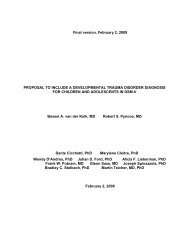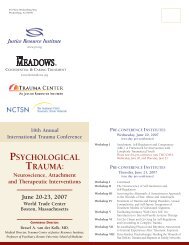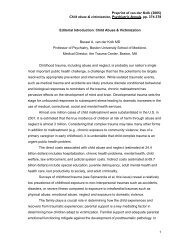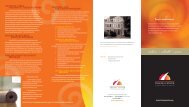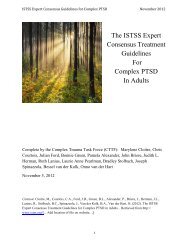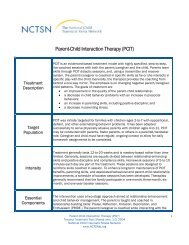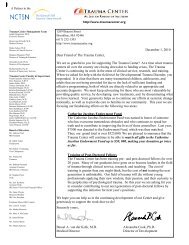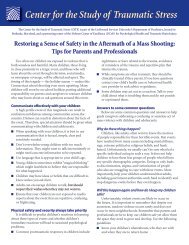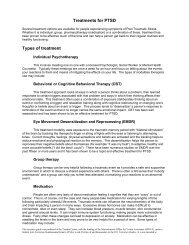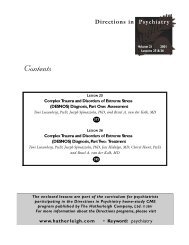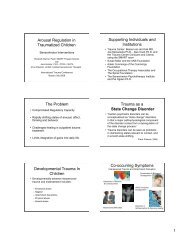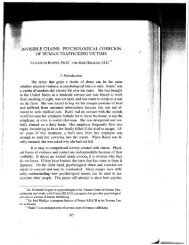in Child Welfare - The Trauma Center
in Child Welfare - The Trauma Center
in Child Welfare - The Trauma Center
Create successful ePaper yourself
Turn your PDF publications into a flip-book with our unique Google optimized e-Paper software.
A Birth Parent’s Perspective: What Happened?Pamela TooheyAs a Parent Partner, <strong>in</strong> San Diego, I providepeer-to-peer support to parents <strong>in</strong>volved withthe child welfare system and its communitypartners. I recently attended a Team DecisionMak<strong>in</strong>g (TDM) meet<strong>in</strong>g as support forToni*, a 20 year old mom just released fromjail with two children under the age of three.<strong>Child</strong> <strong>Welfare</strong> scheduled the TDM to f<strong>in</strong>dsafe and suitable out-of-home care for Toni’schildren. Four days prior, their hotel roomwas raided by police. Toni and a 17-yearold friend were prostitut<strong>in</strong>g from the hotelroom with two m<strong>in</strong>or children present. Alsostay<strong>in</strong>g <strong>in</strong> the room was Toni’s current malepartner, the father of her seven month olddaughter and a known drug dealer. Policefound proof of prostitution along with drugsand paraphernalia. <strong>The</strong> adults were taken <strong>in</strong>tocustody and so were the children.Present at the TDM, besides agencyprofessionals, were ten family members<strong>in</strong>clud<strong>in</strong>g aunts, uncles, and grandparents.All of the family members claimed tobe clean and/or sober rang<strong>in</strong>g from sixmonths to seventeen years. All but two ofthe family members had previous childwelfare <strong>in</strong>volvement, and most had crim<strong>in</strong>albackgrounds as well. Now solid members oftheir community, their pasts may still preventthem be<strong>in</strong>g considered for placement of thechildren.This family’s story is just one of manythat I have heard. <strong>The</strong> families might lookdifferent with different cultures and socioeconomicalbackgrounds. <strong>The</strong>ir presentconditions may or may not <strong>in</strong>clude: substanceabuse, domestic violence, mental health issues;neglect, endangerment, physical or sexualabuse of their children; and homelessness,but each and every adult I‘ve worked withreported an average of 4-5 adverse childhoodexperiences such as neglect, physical or sexualabuse, <strong>in</strong>carcerated or substance/alcoholabus<strong>in</strong>g parents (acestudy.org). Many claimedtheir parents survived adverse childhoodexperiences as well.What if we asked the parents, those adultswho proclaim parental love of their children<strong>in</strong> spite of the situation they f<strong>in</strong>d themselvesCW360 o <strong>Trauma</strong>-Informed <strong>Child</strong> <strong>Welfare</strong> Practice • W<strong>in</strong>ter 2013 29<strong>in</strong>, “What happened <strong>in</strong> your life as a child?”What if <strong>in</strong>stead of view<strong>in</strong>g the adults asaddicts, crim<strong>in</strong>als, co-dependents, mentallychallenged, and bad parents, we looked atthem as adult children who have survivedadverse childhood experiences and viewedtheir co-occurr<strong>in</strong>g conditions and maladaptivebehaviors as symptoms of hav<strong>in</strong>g survivedthese experiences? What if we explored a newk<strong>in</strong>d of genogram to determ<strong>in</strong>e how manyfamily members and ancestors displayedor presented the same life conditions orsituations as the parent? What would we f<strong>in</strong>d?In 1997, I was arrested and taken <strong>in</strong>tocustody, and my three year old son was placed<strong>in</strong> foster care. I was charged with be<strong>in</strong>g underthe <strong>in</strong>fluence of methamphetam<strong>in</strong>e, <strong>in</strong>tentto sell, and child neglect and endangerment.I had a long history of substance abuse,domestic violence, and crim<strong>in</strong>al activity. Mylife was <strong>in</strong> utter chaos, and my son was therewith me.I, too, was raised <strong>in</strong> a chaotic,dysfunctional home. My father was analcoholic, who served <strong>in</strong> the Army and spentWhat if <strong>in</strong>stead of view<strong>in</strong>g the adults as addicts, crim<strong>in</strong>als,co-dependents, mentally challenged, and bad parents, we looked atthem as adult children who have survived adverse childhood experiencesand viewed their co-occurr<strong>in</strong>g conditions and maladaptive behaviors assymptoms of hav<strong>in</strong>g survived these experiences?most of his time away from home. He leftmy sister and me <strong>in</strong> the care of my mentallyill mother. Both sets of grandparents werealcoholics. I was molested as a child; sowere both of my parents and both maternaland paternal grandmothers. My paternalgrandmother, great-grandmother, and mymaternal grandmother became <strong>in</strong>volved<strong>in</strong> prostitution. So did I. My paternalgrandparents, maternal grandparents andgreat-grandparents were all <strong>in</strong>volved <strong>in</strong> someform of crim<strong>in</strong>al activity. So was I. <strong>The</strong>y allabused and neglected their children. So did I.When would it stop?When I was arrested, there wereprofessionals concerned about my son’sphysical safety and development. <strong>The</strong>yordered psychological test<strong>in</strong>g for my son; noone asked about me. My son went to fostercare and had physical, developmental andmental health assessments and therapy. I wentthrough all of the court ordered services:substance abuse treatment, probation,parent<strong>in</strong>g classes, and <strong>in</strong>-home supportservices. I changed my life. I rega<strong>in</strong>ed custodyof my son. Yet no one thought to ask how Iwas do<strong>in</strong>g or if I needed any help.In 2000, I received the trauma-focusedtherapy and help that I needed and so didmy son. I didn’t know to ask for it, so Ididn’t go look<strong>in</strong>g for it; it found me. Myson was molested by a neighborhood youthwho had been <strong>in</strong> our home many times. Ididn’t know the red flags or recognize thesigns of possible danger because no one had<strong>in</strong>tervened, assessed, or educated me on myown molestation. If I had, this could havebeen prevented.I believe that adverse childhoodexperiences and the maladaptive behaviorswe develop <strong>in</strong> order to survive are<strong>in</strong>tergenerational. I have learned to take arisk, to reach out and help educate the familymembers I work with, to understand theeffects of trauma. I ask, “What happened toyou as a child?” I refer them to appropriateand immediate mental health and communityservices and offer my support for as long asit’s needed.It’s your turn to ask—not “What’s wrongwith you?” but “What happened to you?”*Name changed to protect privacy.Pamela Toohey is the Founder/CEO ofthe Birth Parent Association. She can bereached at www.birthparentassocation.com.Perspectives



